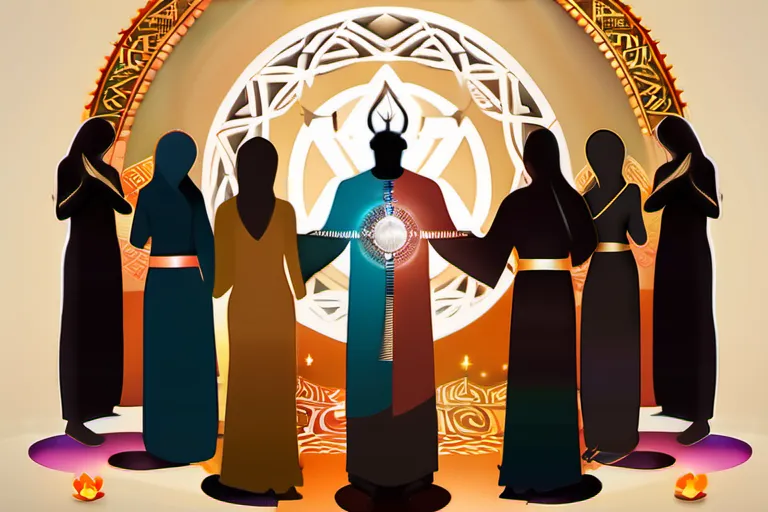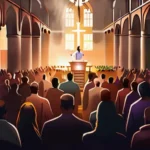Exploring the reasons behind religious conversion, the journey, and its implications.
Have you ever wondered why people change their religious beliefs? In this comprehensive article, we delve into the fascinating world of religious conversion, examining the various factors that drive individuals to embrace new faiths and leave behind old ones. From personal growth and spiritual seeking to social pressures and cultural shifts, we explore the complexities of this transformative process.
The Pursuit of Meaning: Personal Motivations for Conversion
Have you ever wondered why someone would leave one religion for another? The journey of religious conversion is as complex and varied as the individuals who undertake it. It often begins with a deep-seated need to find meaning in life, a quest that can be both exhilarating and challenging.
Many turn towards new religious beliefs because they feel like they’re searching for their spiritual home, a place where they can feel accepted and understood. Is it just the allure of something different or is there more to it? Often, these individuals are driven by a desire for personal growth. They may see religion as a tool to help them navigate life’s complexities, offering guidance and support in times of doubt.
The search for meaning can be like wandering through a dense forest; every path seems to lead somewhere new. For some, it might start with spiritual seeking, where they explore different beliefs out of curiosity or a desire to understand the world better. Others find themselves drawn to a religion because it provides them with a sense of purpose and belonging that their previous faith couldn’t offer.
In this pursuit, challenges abound. The transition can be fraught with doubt and fear, as individuals grapple with leaving behind familiar structures and communities. They must also navigate the potential conflict between old and new beliefs, often questioning their own identity in the process. It’s like crossing a river: you must be prepared to let go of what’s known and embrace the unknown.
Ultimately, religious conversion is not just about changing one’s belief system; it’s a profound personal journey that can transform an individual’s worldview and shape their future. Each step along this path is unique, reflecting the diverse tapestry of human experience. Are you on the verge of such a transformation yourself? What might be driving your search for new meaning in life?
Social Factors in Religious Conversion: Peer Pressure and Cultural Shifts
Imagine standing at the crossroads of life, where every path seems to hold a promise but none guarantees a clear direction. For many, this intersection becomes a pivotal moment leading towards religious conversion. One significant factor that often guides this journey is the influence of social factors. Peer pressure and cultural shifts can be powerful forces, subtly or forcefully steering individuals toward new beliefs.
Consider the scenario where you’re surrounded by friends who embrace a different faith. How do their convictions and practices start to resonate with your own questions about life’s purpose? Is it merely a case of fitting in, or is there more at play? Peer pressure can be like a gentle wind guiding direction, but it often carries deeper meanings that are worth exploring.
Cultural shifts also play an essential role. Think of religion as the soil of culture; when these soils mix and merge, they can produce unexpected blooms. A community’s values, traditions, and practices may shift over time, prompting individuals to reconsider their beliefs. How do these broader cultural changes shape one’s identity? Are you drawn to a new faith because it aligns with evolving societal norms or simply because it offers a fresh perspective?
The influence of family and community cannot be overlooked either. Family members often serve as anchors in our spiritual journeys, offering support and encouragement when we’re ready to explore different paths. Community plays a similar role, providing the necessary framework for support and belonging during this transformative period.
So, how do these social factors intertwine with personal motivations? Can peer pressure lead to genuine spiritual seeking or just conformity? How does cultural change prompt meaningful conversion rather than mere assimilation? These questions guide us through the complex landscape of religious transition, reminding us that every step taken is a journey both internal and external.
The Psychology of Religious Conversion: Cognitive Processes and Emotional Factors
Understanding religious conversion involves delving into the intricate psychological processes that shape one’s beliefs and practices. Have you ever wondered why someone might leave behind familiar traditions for those they find strange? What drives this profound transformation in thought and identity?
Cognitive processes play a crucial role here. Imagine your mind as a vast library, with books representing different belief systems. When someone undergoes religious conversion, it’s like adding an entirely new section to their personal library. They may start by reading one book, slowly gathering knowledge that influences their understanding and ultimately reshaping their worldview.
Emotional factors also deeply influence this journey. Think about how you feel after a significant event in your life—joy, sadness, confusion—all these emotions can shape your beliefs. For many, religious conversion is a deeply emotional experience, filled with feelings of hope, relief, and even doubt. These emotions are like the paint on a canvas; they add layers to their spiritual journey.
Memory and identity are intertwined in this process. Memories of past experiences and significant life events can be reinterpreted through new religious lenses. For example, someone might revisit childhood memories with renewed meaning or understanding after embracing a new faith. This reinterpretation helps solidify their new identity within the community they now belong to.
Understanding these cognitive processes, emotional factors, and the role of memory and identity is crucial for grasping the complexities of religious conversion. It’s like navigating through a maze where every turn brings a fresh perspective, leading you to a different destination—your new faith.
Religious Conversion and Identity: Navigating Cultural and Personal Boundaries
Religious conversion is like stepping into a new world, but it’s often far from easy. Imagine you’re walking through a dense forest, and every step you take brings you closer to a different landscape. This journey isn’t just about changing your clothes or direction; it’s about altering the very essence of who you are. How do individuals navigate these cultural and personal boundaries during such a profound shift?
One of the biggest challenges is reconciling your old identity with this new one. It’s like trying to fit into a perfectly tailored suit that doesn’t quite match your existing wardrobe. You might find yourself questioning whether you’ve truly changed or if there are aspects of your past self that still linger. How do you let go of what made you who you were, while embracing the new? This is not just about beliefs but also about community and cultural ties.
Many converts find themselves caught between two worlds—straddling the line where their old life and their new faith intersect. It’s a delicate balance that requires constant negotiation. They might feel like they’re walking on thin ice, afraid of stepping too far into one world and losing touch with the other. How do they bridge these gaps without feeling torn apart?
Strategies to integrate this new religious identity can vary widely. Some find solace in small, everyday rituals that gradually weave their new beliefs into their daily life. Others might seek out support groups or mentors who have gone through similar experiences. Still, some may need to redefine their social circles and relationships, letting go of old friendships that don’t align with their newfound faith.
Ultimately, the journey of religious conversion is a deeply personal one. It’s about finding your place in this world, not just from a spiritual perspective but also culturally and personally. The challenge lies in creating a new identity that honors both your past and your present, all while embracing the future with open arms.
The Impact of Religious Conversion on Society: Implications and Controversies
How does religious conversion ripple through society, touching the delicate threads that hold communities together? The impact of religious conversion on interfaith relations is profound, often acting as both a bridge and a barrier. Social cohesion, once seen as a solid foundation, can crumble under the weight of differing beliefs and practices. How do we navigate this tension when faith is so intertwined with personal identity?
Religion plays a pivotal role in shaping societal norms and values. When an individual converts to a new faith, they not only change their own worldview but also contribute to or challenge existing social structures. This can lead to significant debates about the future direction of society. Should we embrace diversity in belief systems, or protect traditional values? The answers are as varied as the individuals making these choices.
The controversy surrounding religious conversion often centers around freedom of choice versus pressure and manipulation. How do we ensure that conversions are truly voluntary and not coerced? This question is particularly poignant when considering the potential for exploitation, especially in marginalized communities. It’s a delicate balance between supporting individual autonomy and safeguarding vulnerable populations.
The broader implications of religious conversion extend beyond personal transformation; they shape the very fabric of societies. As individuals move from one faith to another, they bring with them new perspectives that can either enrich or disrupt communal harmony. In this shifting landscape, the question remains: How do we foster an environment where different religions can coexist peacefully, learning from each other’s beliefs and practices?
Understanding these complexities is crucial for building inclusive societies where religious diversity is not just tolerated but celebrated. The journey of religious conversion is a powerful narrative that touches on the core of human identity, belief, and community. It challenges us to reflect on our own values and the role they play in shaping our interactions with others.
Case Studies: Real-Life Stories of Religious Conversion
Let’s delve into some compelling case studies that illustrate the complex journey of religious conversion, highlighting the diverse motives and challenges faced by individuals. Consider the story of Sarah, who was born into a Jewish family but found herself drawn to Christianity after years of introspection.
Why did Sarah leave her familiar spiritual roots? Her journey began when she started questioning traditional practices and sought answers in the teachings of Jesus Christ. She felt a profound emotional connection that resonated with her personal experiences, much like finding a new key that unlocks the door to a long-sealed room within herself.
Another individual, Ahmed, converted from Islam to Christianity due to his deep exploration of religious texts and beliefs. He found himself wrestling with questions about faith and identity, much like navigating through a dense forest where every path seems equally viable yet leads in different directions. His conversion was not just a change of belief but a complete reorientation of his worldview.
Yet another case is that of Maria, who converted from Hinduism to Buddhism after years of spiritual searching. She sought a path that emphasized inner peace and mindfulness over ritualistic practices. Her journey was marked by moments of profound realization, akin to slowly peeling away layers of an onion to get to its core.
These stories underscore the varied and often complex reasons behind religious conversion. Whether it’s a quest for personal meaning, a deep spiritual awakening, or a desire to align with community beliefs, each individual’s journey is unique yet profoundly impactful. The challenges faced—such as societal pressure, family disapproval, and internal conflicts—are as diverse as the individuals themselves.
Understanding these case studies not only provides insight into the personal experiences of those who convert but also highlights the broader implications for interfaith relations and social cohesion in a world where religious identities often shape societal norms and values. Each story is a testament to the enduring quest for spiritual fulfillment, much like wandering through a labyrinth where every path could lead to light or darkness.
Conclusion
 By understanding the motivations, processes, and challenges associated with religious conversion, we gain valuable insights into human behavior and the role of religion in our lives. Whether you’re a seasoned believer or a curious observer, this article offers a thought-provoking exploration of an essential aspect of the human experience.
By understanding the motivations, processes, and challenges associated with religious conversion, we gain valuable insights into human behavior and the role of religion in our lives. Whether you’re a seasoned believer or a curious observer, this article offers a thought-provoking exploration of an essential aspect of the human experience.











